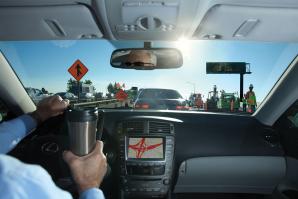Sitting in traffic can be stressful for anyone in a hurry, but the damage to the body and psyche can disproportionately hit low-income people, who are prone to encounter a greater range of destructive agents in their lives, experts say.
Dan Stokols, a professor at the University of California, Irvine, began studying the effects of driving on the psyche in the late 1970s. He says people whose lives generally are pleasant — they enjoy lucrative and worthwhile jobs, for instance — also typically have the luxury of arranging their commute so it isn’t stressful: They can call their colleagues when stuck in traffic to avoid being penalized. Nicer vehicles and car accessories also insulate people from the outside world with air conditioning and various forms of media. For some, traffic presents no burden, Stokols says.
But for the economically challenged, environment-related stressors, such as the condition of a person’s car, travel route, job and home life, have a compounding effect on their physical and emotional soundness.
“To the extent that the traffic congestion is coupled with people’s worries about retaining their job and being foreclosed on their homes, even though the traffic itself is a relatively minor issue, it is still an annoyance or irritant that acquires much more significance because it is part of everything else that is weighing on them,” Stokols says.
These heightened stressors can result in prolonged secretions of the hormone cortisol, which can lead to an impaired immune system, higher blood pressure, obesity and diminished cognitive performance.
“That’s not to say that people who are happy are not bothered by this trend toward deterioration in our infrastructure — I’m sure they are concerned about it — but it doesn’t hit them as viscerally as people who have a lot of other stressors in their life,” Stokols says.
Recommended For You
Pothole Predicament
West Sac's crumbling problem
Due to its port connectivity and excess of freight companies, West Sacramento encounters a disproportionate amount of truck traffic.

Driving Impaired
No signs of improvement for California highways
There are roads that the director of San Joaquin County’s transportation-planning agency forbids his teenage daughter from driving on.


